It is mid-morning on a Wednesday in Extension 8, a township area in Makhanda in the Eastern Cape. Children line up with their containers, eager for their first meal of the day from Lulama Maseti’s pop-up soup kitchen.
Judging by the excited chatter and length of the queue, it seems school is closed for the day and many learners are unable to get their regular meal.
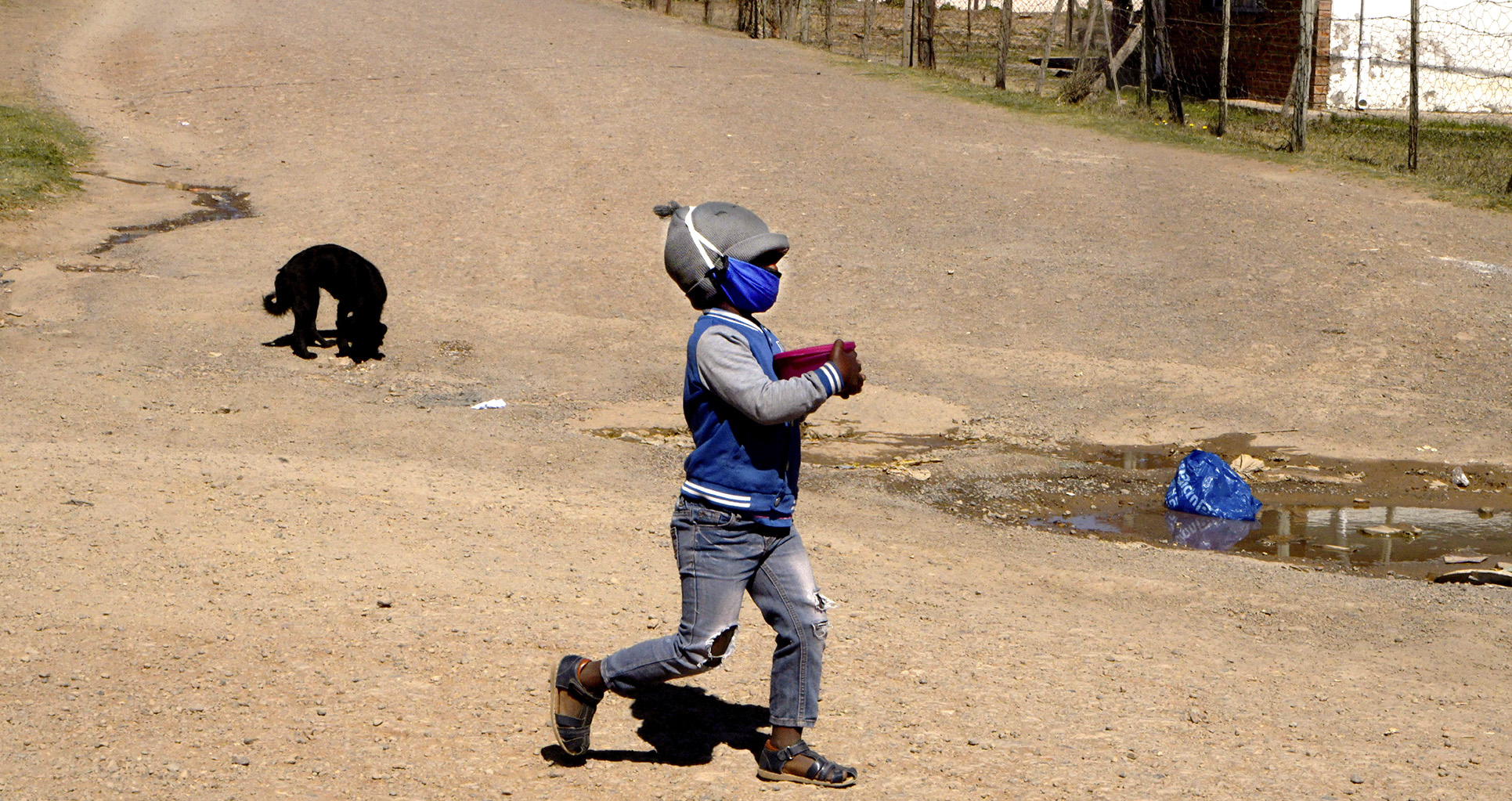 A young child runs home after receiving a meal from Lulama Maseti’s pop-up soup kitchen in Makhanda. (Photo: Black Star / Spotlight)
A young child runs home after receiving a meal from Lulama Maseti’s pop-up soup kitchen in Makhanda. (Photo: Black Star / Spotlight)
Maseti feeds about 100 children and 50 adults every day except Sunday.
Her kitchen runs entirely on donations and vegetables she grows in her own small garden. Makhanda is suffering from a severe drought, so water for her garden is scarce, but she manages with the use of carefully rationed water from the almost empty tank she uses to store rainwater.
Within minutes of removing the lid from the big pot of vegetable stew, all the food has been dished out. Younger children with heaped containers run back home, while teenagers pile on to bicycles, hoping not to spill anything.
Maseti is not the only one helping to feed learners who cannot get their school meals.
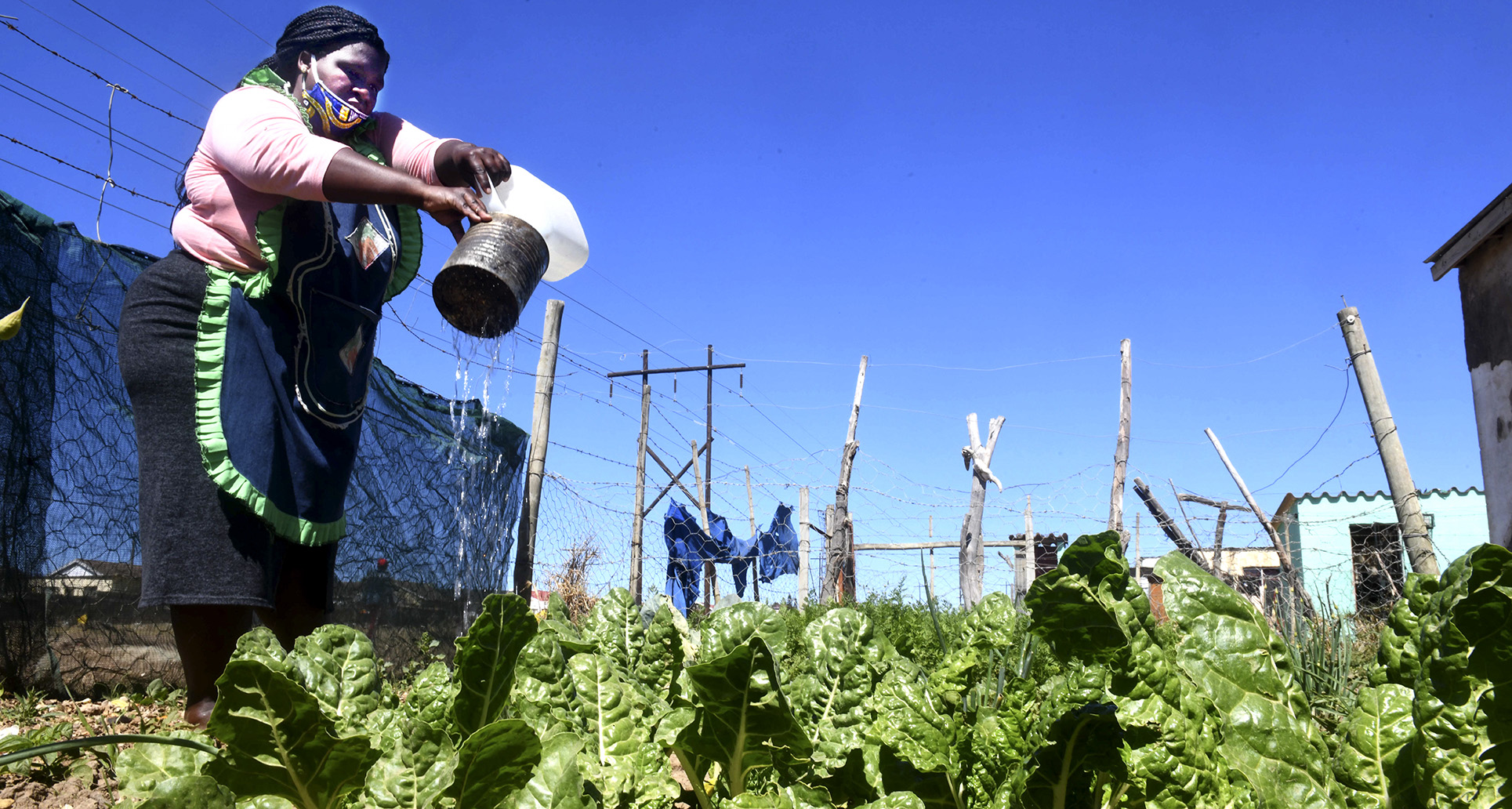 Lulama Maseti waters her garden in Makhanda, Eastern Cape. (Photo: Black Star / Spotlight)
Lulama Maseti waters her garden in Makhanda, Eastern Cape. (Photo: Black Star / Spotlight)
Across Makhanda in an area called Vergenoeg, Desiree Sphere and Kaylynn Erushin have also started a pop-up soup kitchen that feeds members of their community twice a week. Most are children.
While speaking to Spotlight, three children skip across the road towards Sphere’s home. They sit in a row on a step on the front porch of the house, but they are too busy eating chunks of bread stuffed with savoury rice to notice our presence. Sphere says these children are regulars at her home, always coming for food.
The children are siblings – aged three, five and six – and they don’t often attend school. Between bites, the eldest tells Sphere that they spend most of the day begging for food in the community. Now and again, they have something to eat at home in the morning.
Speaking in isiXhosa, the boy says he and his siblings think about food all the time, and that all they want is for there to be food at home.
Civil society fights for school meals
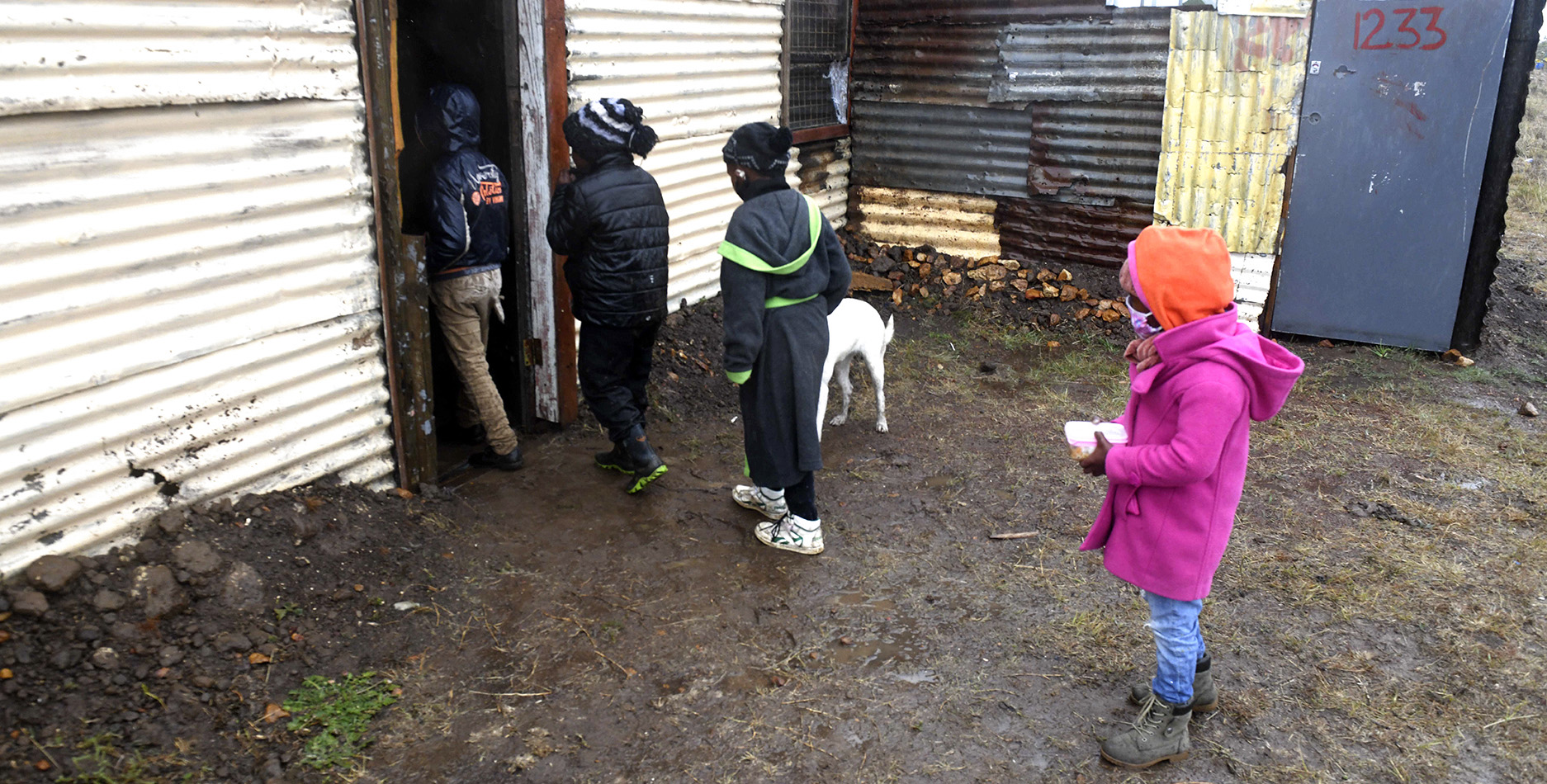 Children queue outside a pop-up soup kitchen in Nkanini, an informal settlement in Makhanda. (Photo: Black Star / Spotlight)
Children queue outside a pop-up soup kitchen in Nkanini, an informal settlement in Makhanda. (Photo: Black Star / Spotlight)
Pop-up soup kitchens have become a regular sight in Makhanda, helping to feed families as well as learners who were unable to get school meals during the hard lockdown.
Normally, the National School Nutrition Programme (NSNP) feeds roughly 9.6 million learners every school day, but this came to a halt for more than three months earlier in 2019.
In July, after legal action by civil society organisation Equal Education and two schools in Limpopo, a judgment handed down in the high court ordered that the department of basic education (DBE) reinstate the NSNP with immediate effect, finding that depriving learners of meals grossly violated their rights.
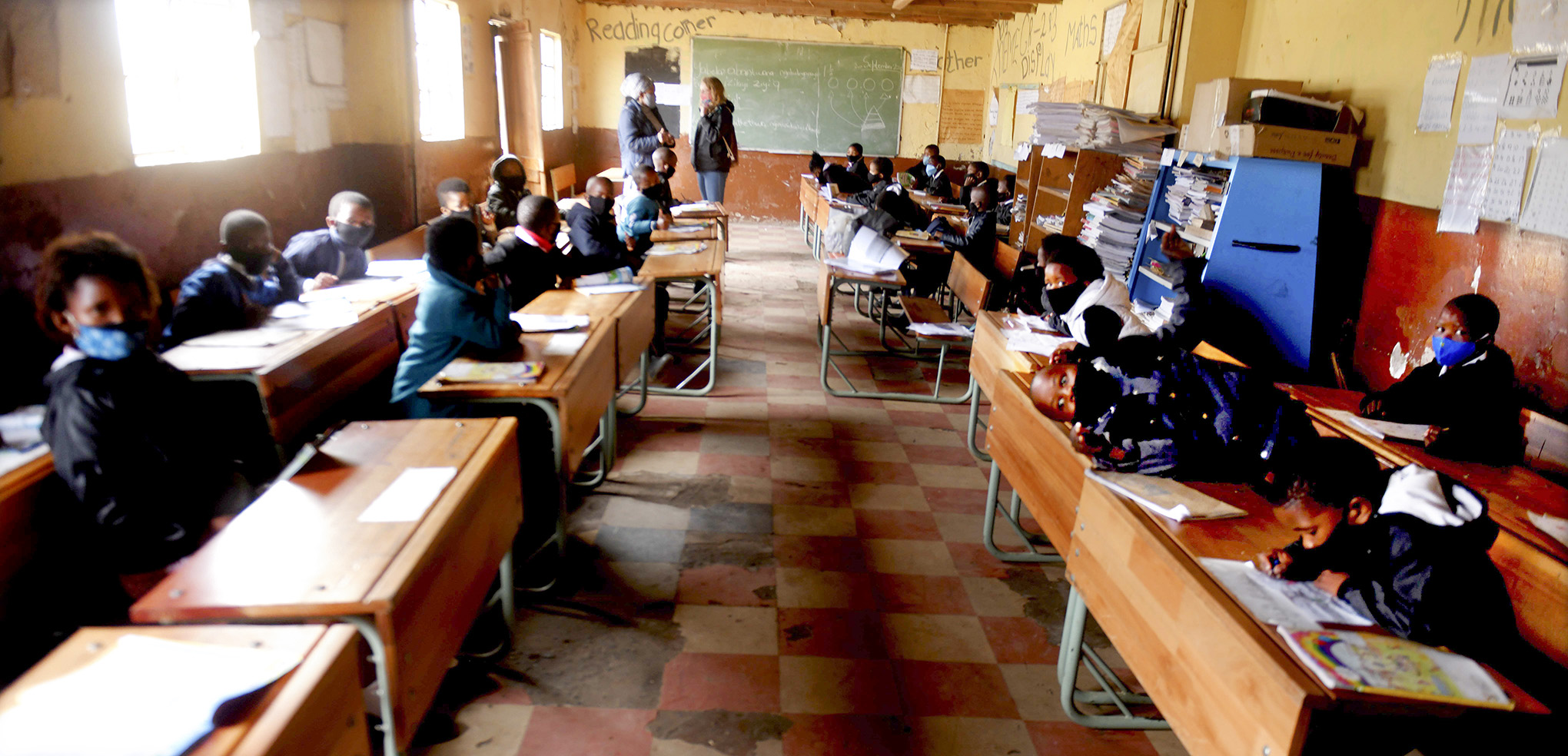 School meals as part of the National School Nutrition Programme at Soga Primary School near Qolora on the Eastern Cape’s Wild Coast. (Photo: Black Star / Spotlight)
School meals as part of the National School Nutrition Programme at Soga Primary School near Qolora on the Eastern Cape’s Wild Coast. (Photo: Black Star / Spotlight)
“Children are categorically vulnerable... poor, hungry children are exceptionally vulnerable. The degree of the violation of their constitutional rights is thus egregious,” said the judgment.
Following the judgment, Equal Education and SECTION27 (a public interest law centre) have closely tracked implementation of the court order and the uptake of the NSNP in each province.
The most recent progress report submitted by provincial education departments shows that the uptake has improved, with more than 8.4 million learners now receiving meals, says Julia Chaskalson, communications officer for SECTION27.
 Soga Primary School near Qolora along the Eastern Cape’s Wild Coast. Photo: Black Star/Spotlight)
Soga Primary School near Qolora along the Eastern Cape’s Wild Coast. Photo: Black Star/Spotlight)
“There are still 1.2 million learners who are not receiving their meals, however.
“In the Western Cape and Free State, numbers of learners accessing the NSNP are worryingly low, with only 40% and 38% of eligible learners reported by the provinces to be collecting meals in these provinces respectively,” says Chaskalson.
Earlier this month, Equal Education, Equal Education Law Centre and SECTION27 submitted a letter to the DBE and provincial departments in response to the previous progress report. The organisations expressed concern that not all learners were receiving meals, and that scholar transport was a barrier for learners to access these meals.
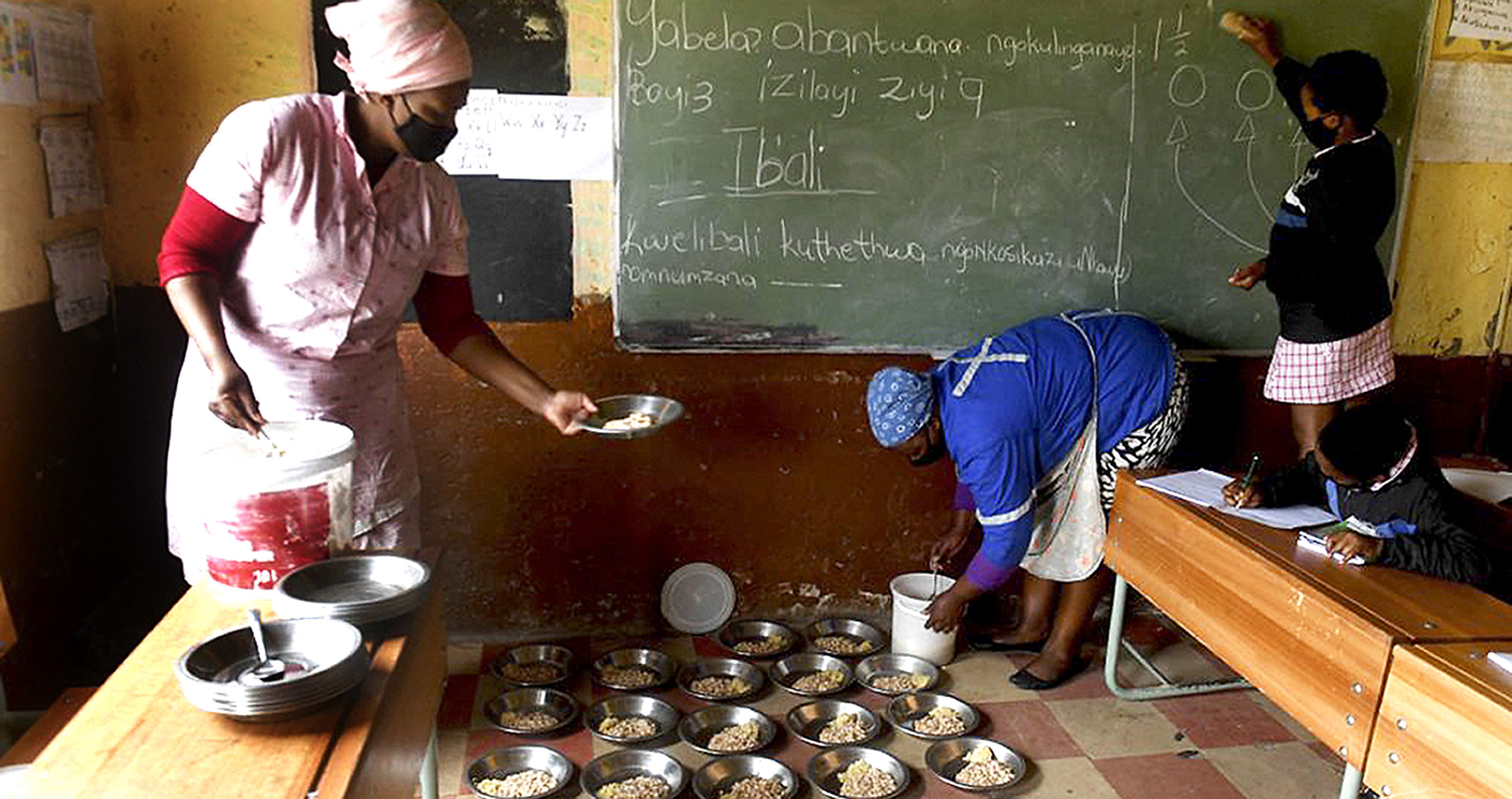 School meals as part of the National School Nutrition Programme at Soga Primary School near Qolora on the Eastern Cape’s Wild Coast. (Photo: Black Star / Spotlight)
School meals as part of the National School Nutrition Programme at Soga Primary School near Qolora on the Eastern Cape’s Wild Coast. (Photo: Black Star / Spotlight)
Some learners could not get home after receiving a meal unless they waited until the end of the school day for transport.
“The DBE notes [in the most recent report] that there is no additional funding for transport for the NSNP, and that learners must use regular scholar transport to collect meals – even if they are not required at school that day.
“But because learners are not offered transport back home after they have collected their food, many choose to remain at home, even if this means they go without the school meal they are entitled to that day,” says Chaskalson.
Feeding learners when there is no school
The organisations asked the DBE to consider food parcels, takeaway meals or vouchers for learners on days they are not in school.
“The [new] reports suggest the DBE is unwilling to explore the option of distributing food parcels to learners for the days they are not expected at school because of rotating or platooning timetable systems, citing the higher cost of food parcels compared with the bulk hot meals typically cooked at school as the main reason this would not be possible.”
However, Mpumalanga and the Northern Cape have distributed food parcels to learners on days that there is no school, she adds.
“The DBE has also stated that food vouchers are not ‘feasible’ in this financial year but have not given further information as to whether this might be explored in the future, particularly if schools are again forced to close in the event of a second wave of Covid-19 infections.
“Although the DBE has committed to ensuring that all qualifying learners receive the meals they are entitled to if there is another period of school closures due to a second wave, which is an undertaking that we welcome, we are still unclear on how the DBE intends to get meals into the hands of learners who need them if they are at home for long periods of time.”
The DBE failed to respond to our request for comment on these issues.
School meals as a lifeline for children and families
To better understand how the absence of the NSNP affected learners directly, Spotlight heard the stories of three students from different provinces.
“Before the [re-introduction] of school meals, life at home was difficult. It [wasn’t easy] because there was no one working at home and we did not have anyone to provide a proper meal,” says Xolisa Mawonga, a Grade 11 learner from the Eastern Cape.
“When meals at school stopped, I was extremely concerned [because] it meant that food was very limited, especially for those of us who had close to nothing.”
Mawonga says the meals they receive at school are not sufficient, and that the small portions only ease their hunger for a short while.
On weekends and days that Mawonga cannot access school meals, he says they must ask people in the community to help with food. They also offer to do odd jobs or ask for donations “just so we can get a proper meal”.
“Young people and children should be interviewed and included to discuss the consequences of the decision-makers,” he adds.
“Having a soup kitchen could be key [to addressing child hunger and nutrition] and would really assist learners who were relying on the nutrition at school.
“We could also get donations and fruit baskets to try and balance the diet and food intake,” says Mawonga.
A 16-year-old learner from Limpopo, who asked to remain anonymous, shares a similar story.
“Life won't be easy now if there is no food at school, because some of us students go to school hungry. We are from the poor families who are unable to afford to buy food for breakfast,” says the learner.
“We normally get food from our breadwinners who try their best to put food on the table so that we don’t go to bed hungry.
“It was hard for me when I heard there will no longer be school food during hard lockdown because sometimes I leave home on an empty stomach without breakfast, hoping that at school they will provide some meals.
“So now it’s really hard because my parents cannot afford to make a lunch box for me,” the learner adds.
Now that school meals have resumed, this learner says portion sizes are smaller than before, but that the food is healthy. However, both this learner and Mawonga say the meals should have more fruit and vegetables and less starch.
“I think before the government can make any decisions about the food they provide at school, they need to look at the children's background first, because most of us come from poor backgrounds,” says the learner from Limpopo.
“I think children must at least make a garden for themselves so that they [don’t] suffer more. At least when they have vegetables in their yard, it won't be a problem for them to get food.
“Most of the families cannot afford to buy vegetables every day, so I think having a garden in their yard is the best solution and [there] won't be any malnutrition if they could at least eat vegetables,” says the learner.
“Tragic,” is the word Liyabona Mkhize, a Grade 11 learner from Gauteng, uses to describe the situation after hearing there would be no school meals during the hard lockdown.
“Some families [do not have access] to any social grant, knowing very well that the food that was provided at school could at least play a vital role in a learner’s life by not letting them go to sleep hungry,” says Mkhize.
Calls for solutions
Mkhize says the government should do surveys to better understand what learners and their communities feel about the decisions that are being made, and give learners the opportunity to also suggest possible solutions.
Mkhize says schools should provide food parcels twice a month to learners to take home, and that government should better fund NGOs that provide soup kitchens.
While the work being done in Makhanda by people like Maseti, Sphere and Erushin helps learners to get a much-needed meal, it is questionable whether this offers a sustainable long term solution.
“Because challenges with scholar transport and rotating school timetables are likely to persist, we urge the DBE to consider the distribution of food parcels and food vouchers to ensure that all 9.6 million learners’ nutritional needs are being met, even on the days they are at home,” says Chaskalson. DM/MC
Note: SECTION27 is quoted in this article. Spotlight is published by SECTION27 and the TAC, but is editorially independent, an independence that the editors guard jealously. Spotlight is a member of the South African Press Council.
When kids go hungry is a six-part series looking at the effects of the Covid-19 pandemic and lockdown on the nutritional status of children in South Africa. This series is supported by Media Monitoring Africa as part of the 2020 Isu Elihle Awards.
This article was published by Spotlight – health journalism in the public interest. Sign up for our newsletter.




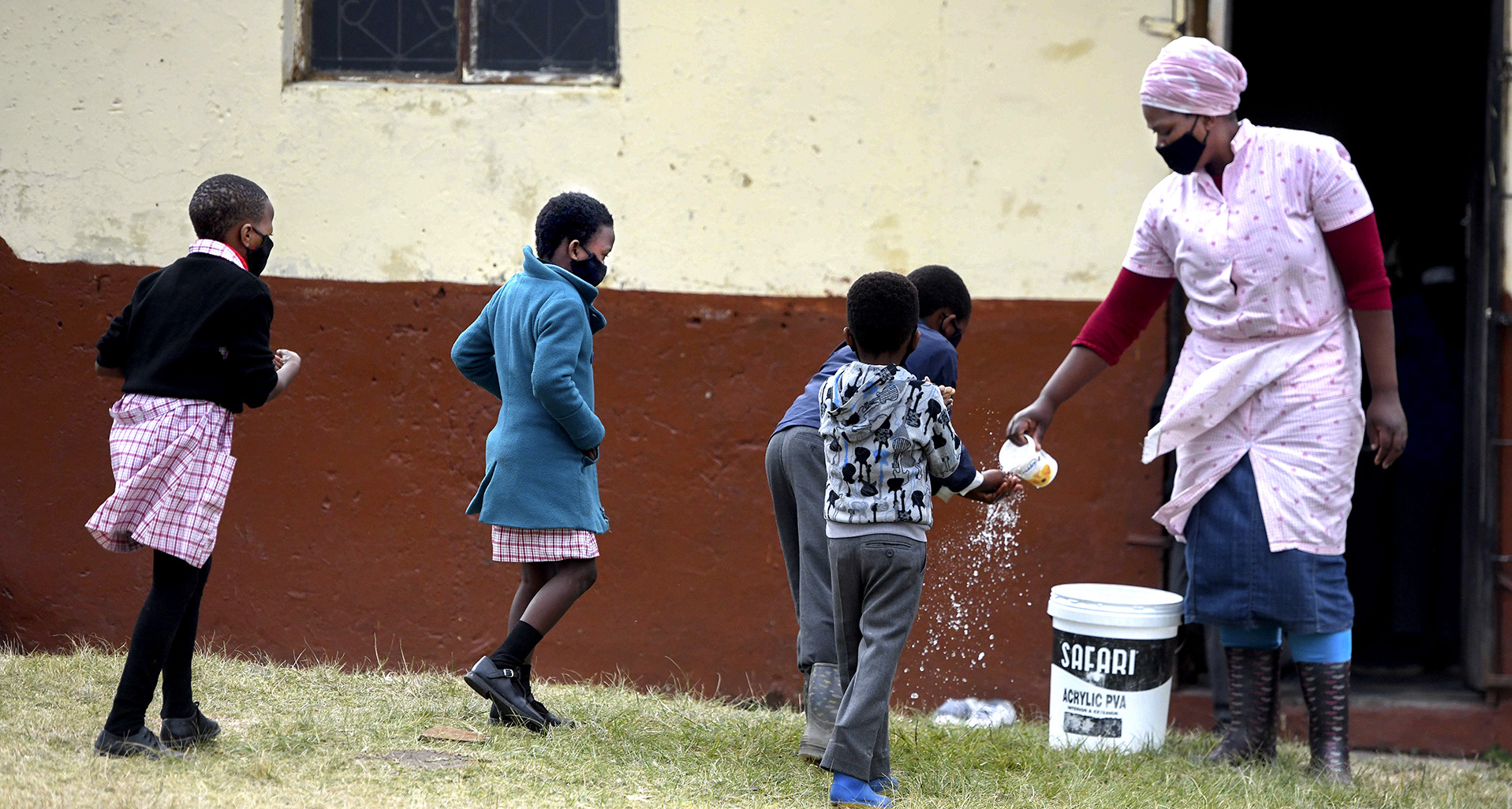 School meals as part of the National School Nutrition Programme at Soga Primary School near Qolora on the Eastern Cape’s Wild Coast. (Photo: Black Star / Spotlight)
School meals as part of the National School Nutrition Programme at Soga Primary School near Qolora on the Eastern Cape’s Wild Coast. (Photo: Black Star / Spotlight)